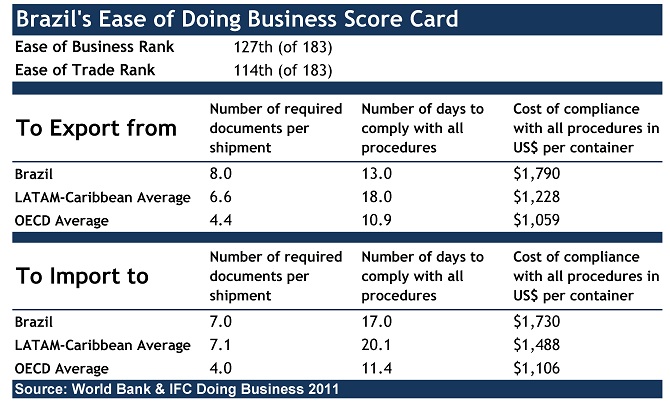World Bank’s annual report is a treasure trove of free information
by Bill Armbruster, blog anchor
Want to know how many documents it takes to ship a container to China? Or the cost of export compliance in Brazil?
Then check out the World Bank’s annual Doing Business Report. It’s by far the best source I have ever found for nitty-gritty information about doing business in any country. It’s also great for making comparisons, and it’s very easy to use. And it won’t cost you anything!
The report, which covers 183 economies, is best known for its rankings on the overall ease of doing business. The rankings are based on a country’s performance in nine major categories, including trading across borders.
The trade rankings are based on the average cost for the inland portion of shipping a container, the time it takes to clear the border, and the number of documents required. The first table below provides that information on Brazil and compares its performance with the averages for Latin America and the Caribbean and with the 30 advanced economies comprising the Organization for Economic Cooperation and Development.
The cost and time totals are based on four elements in the export and import process: documents preparation; customs clearance and technical control; ports and terminal handling; and inland transportation and handling. The second table provides that information for Brazil.
The report assumes that the goods are dry cargo, shipped in a 20-foot, full container load, and that the cargo weighs 10 tons and is valued at $20,000. Other assumptions include that the cargo is not hazardous and that it is one of the country’s leading imports or exports.
You can get the same type of detailed information in other eight categories: starting a business, taxes, contract enforcement, getting credit, registering property, investor protection, getting construction permits and closing a business. For example, if you’re interested in contract enforcement, the report will tell you the number of procedures involved in filing a claim, the time to process a claim, and the cost as a percentage of the claim.
Charts and graphs, too
You can download a detailed profile on each economy, with lots of charts and graphs, compare how a country has performed in previous years, going back to 2004.
The report also contains detailed breakdowns by city and region for more than a dozen countries. For China, it lists 30 cities. Hangzhou is the easiest in which to start a business, while Shanghai is the most efficient for registering property, and Guangzhou is the best for contract enforcement.
It’s probably no surprise to many of you that Singapore grabbed the top spot in the rankings for both the overall ease of doing business and in the trade category. The US placed fifth in the overall rankings, but a rather lackluster 20th in trade.
Besides the nine categories in which countries are ranked, Doing Business has separate sections on business reforms and laws and regulations. Other sections explain the methodology that goes into the report and list the contributors willing to be identified. For China, there were about 60; for Brazil, more than 100. All of them are based in the country for which they are contributing to the profile.
Which brings me to this point: The World Bank is looking for freight forwarders, customs brokers, lawyers, consultants, shipping executives, port officials, bankers, accountants and others willing to make a limited time commitment and lend their expertise to producing the report. Learn more.
The report also has a really cool Business Planet feature that gives you very quick and easy snapshots for each of the 183 economies included in the report.
Finally, let me re-emphasize my basic point: Doing Business is a fabulous, fabulous resource.
 Bill Armbruster, the anchor for the Datamyne Blog has covered shipping and trade for 30 years as a reporter and editor with The Journal of Commerce and Shipping Digest. “I’ll be blogging on headline news and current issues in oceangoing commerce, trying to shed some light on the backstories and, wherever I can, supply some sound advice for shippers.” Write Bill care of [email protected].
Bill Armbruster, the anchor for the Datamyne Blog has covered shipping and trade for 30 years as a reporter and editor with The Journal of Commerce and Shipping Digest. “I’ll be blogging on headline news and current issues in oceangoing commerce, trying to shed some light on the backstories and, wherever I can, supply some sound advice for shippers.” Write Bill care of [email protected].
The opinions expressed in this article are those of its author and do not purport to reflect the opinions or views or Descartes Datamyne. In addition, this article is for general information purposes only and it’s not intended to provide legal advice or opinions of any kind and my not be used for professional or commercial purposes. No one should act, or refrain from acting, based solely on this article without first seeking appropriate legal or other professional advice.





